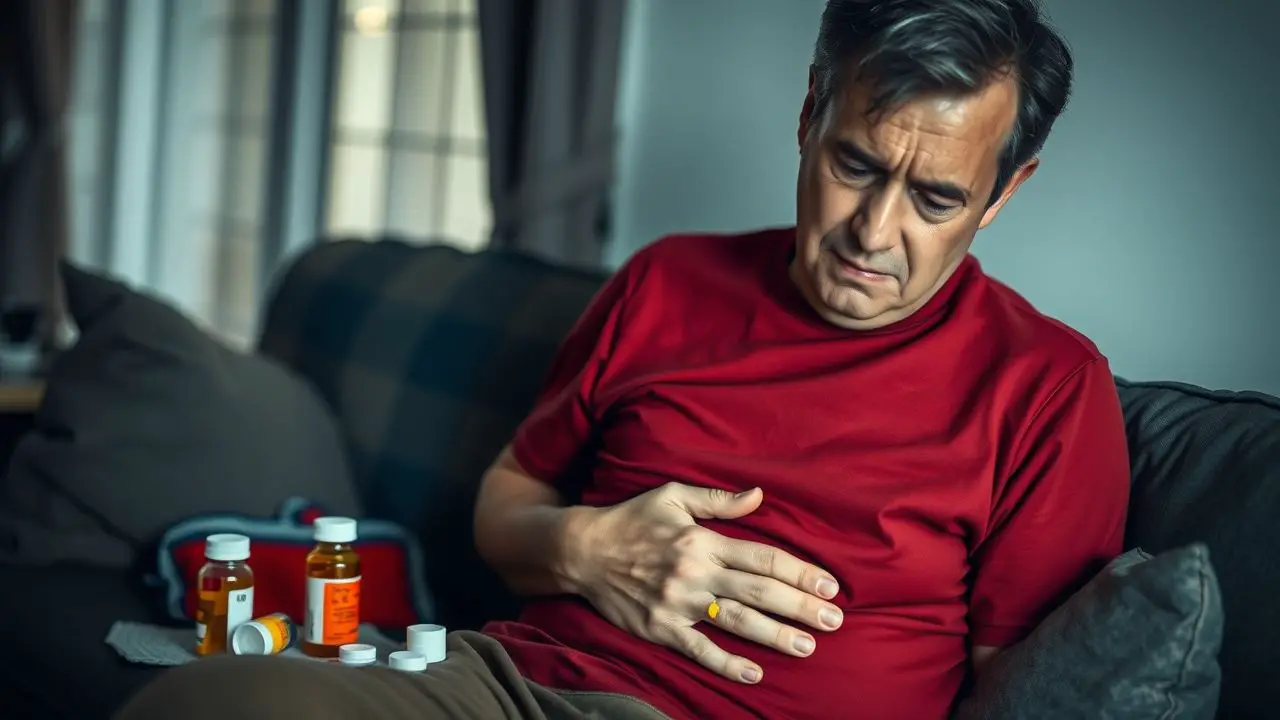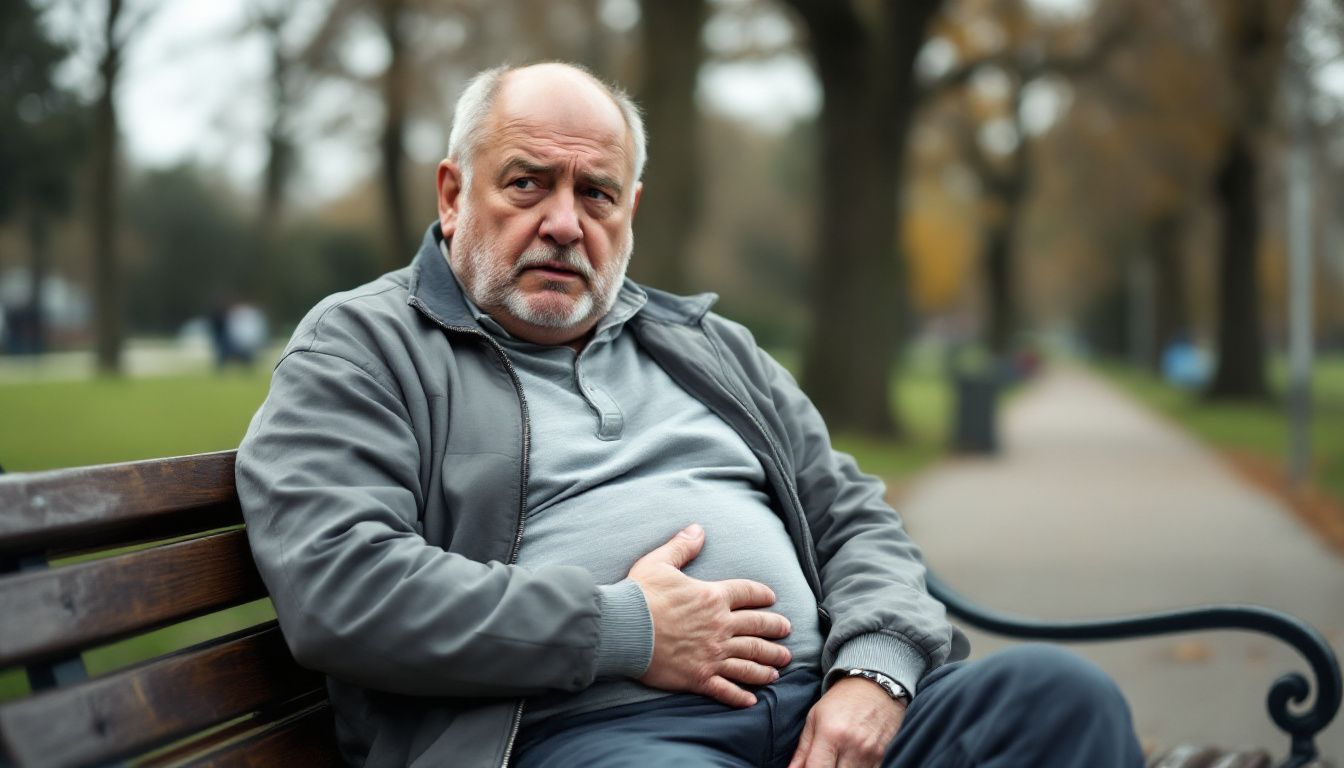Eating right is key during prostate cancer treatments. Protein helps repair body damage. This article guides you through the best foods to eat. Keep reading for tips and recommendations.
Key Takeaways
- Eating high-protein foods like eggs, nuts, and fish helps the body heal during prostate radiation. Drinking meal replacement drinks is also good if eating solid food is tough.
- Foods rich in unsaturated fats such as nuts, seeds, and olive oil support prostate health by making the body stronger against cancer treatment effects.
- Staying hydrated is very important. Drink 8 to 12 cups of water daily and try other fluids like milk or herbal teas to keep your energy up.
- Adding ginger tea and L-Arginine can reduce inflammation and help blood flow better during prostate health recovery.
- Avoid fatty foods, high-sugar snacks, spicy meals, and caffeine as they can make side effects worse during treatment.
Essential Nutrients for Recovery

Eating right helps your body fight back. Foods rich in protein and good fats rebuild strength fast.
High Protein Foods
Protein is key for healing during prostate radiation. Eat foods like eggs, nuts, seeds, and dairy. Also include meats, poultry, and fish. These items help rebuild tissues damaged by treatment.
For those finding solid food hard to eat, try meal replacement drinks packed with protein.
A balanced diet rich in these proteins plus fruits, vegetables, and whole grains supports recovery. This combination boosts the immune system and helps manage side effects of treatment.
Eat small meals often throughout the day for better digestion and energy levels.
Healthy Fats and Oils
Eat foods rich in unsaturated fats for prostate health. These include nuts, seeds, and olive oil. Unsaturated fats are crucial – they help your body work better during treatment. Foods like avocados and fatty fish provide these healthy oils.
They support healing and improve how your body responds to radiation.
Avoid high-fat dairy products and processed meats. High-fat foods can make side effects worse. Instead, choose lean proteins and combine them with healthy oils from plants. This mix supports a well-balanced diet.
Next up, let’s talk about increasing fiber intake for better recovery.
Recommended Dietary Changes

Eating right helps your body fight. Add more plant fibers and drink lots of water.
Increase Fiber Intake
To help manage gastrointestinal issues during prostate radiation therapy, it’s critical to adjust your fiber intake. Whole grains and legumes pack a powerful fiber punch that can ease bowel movements.
Fruits like apples and berries are high in fiber and keep the body hydrated. Aim for 25 to 30 grams of fiber each day.
A healthy diet rich in soluble and insoluble fibers plays a key role in maintaining digestive health during radiation therapy.
These foods improve digestion without causing discomfort. Including vegetables such as broccoli and carrots in your meals adds necessary bulk to aid regularity. Drink plenty of water to support the benefits of a high-fiber diet, preventing constipation effectively.
Hydration Focus
Drinking enough water every day is key during prostate radiation. Patients need 8 to 12 cups daily. This helps lower side effects and keeps organs safe. Milk, teas, and sports drinks are good choices too.
They add more fluids to your body. Try flavored waters or those with fruit for taste variety.
Eating foods like soup and yogurt also boosts hydration. These options work well if you find drinking water hard due to mouth sores or a metallic taste from therapy. Always choose non-alcoholic drinks and avoid caffeine which can dehydrate you further.
Specific Foods and Their Benefits During Treatment
Some foods can really help your body during prostate cancer treatment. They give you strength and fight off the bad cells.
Green Tea and Its Benefits for Prostate Cancer
Green tea helps fight prostate cancer. It has substances that kill cancer cells and stop them from growing. Men drinking green tea have a lower chance of getting prostate cancer. This is not just talk—research shows it’s true.
Green tea has antioxidants, which protect the body from damage. It’s a simple choice: adding a few cups of green tea to your daily routine could keep your prostate healthier.
Drinking this beverage comes with advice, though. Limit caffeine to avoid dry mouth, especially if you’re having other treatments like radiation. Next up, let’s discuss how Ashwagandha supports prostate health.
The Role of Ashwagandha in Prostate Health
Ashwagandha plays a crucial role in prostate health. Studies show it helps reduce inflammation and supports the immune system during prostate cancer treatment. This herb also reduces stress, which is vital for patients undergoing therapy.
Its potential anti-cancer properties could specifically benefit the prostate, though more research is needed to confirm its effectiveness.
Incorporating Ashwagandha into a diet might improve well-being for those with prostate issues. It offers hope as a natural supplement alongside traditional treatments, highlighting its importance in managing prostate health challenges.
Cashew Nuts and Olive Oil: Nutritional Benefits for the Prostate
Switching from Ashwagandha, let’s talk about cashew nuts and olive oil. Both are power foods for your prostate. Cashew nuts pack a punch with proteins and healthy fats. They help your body repair after radiotherapy.
Eating them can make you stronger, faster.
Olive oil is another hero. It has fats that are good for you and helps fight cancer cells in the prostate. I’ve cooked with it and felt its benefits first-hand. It makes food taste better and boosts your health at the same time.
Include olive oil in your diet to enhance prostate health.
The Importance of Cold Water and Hydration
Drinking enough water keeps you hydrated, especially important during prostate cancer therapy. Men need 8 to 12 cups daily. This helps with fatigue and keeps your body strong. Non-alcoholic drinks, like flavored waters or those infused with fruit, also help.
Milk and sports drinks work well too. Don’t forget moist foods such as soup, Jell-O, yogurt, sherbet, and pudding; they add to your fluid intake.
Staying hydrated can ease some side effects of treatment like loose stools or difficulty chewing and swallowing. It makes soft foods easier to eat and supports oral hygiene by helping you keep your mouth clean—vital when dealing with mucositis from radiation in the pelvic area.
Next up: exploring how green tea benefits men undergoing this therapy.
L-Arginine, Ginger Tea, and Their Effects on Prostate Health
L-Arginine, a vital amino acid, supports the body in making proteins. It helps improve blood flow and aids prostate health recovery after radiation treatment. Ginger tea reduces inflammation and pain, making it a good choice for men with prostate issues.
Both work well to enhance recovery during prostate cancer treatments.
Eating nuts, seeds, and soy foods also benefits those undergoing radiation therapy for prostate health. These foods are rich in nutrients that support healing and strength. Next on the list is how eggs play a role in maintaining a healthy prostate.
Evaluating the Role of Eggs in Prostate Health
Eggs are a key food for men with prostate issues. They pack a lot of protein. This helps bodies recover faster during treatments like radiation. Eggs also have other good things like vitamins and minerals.
These support overall health, including the prostate.
Doctors often suggest eggs to cancer patients. Why? Because they help you not lose weight fast during treatment. Plus, eating eggs is easy for most people. Next, let’s talk about watermelon and iodine for prostate well-being.
Watermelon and Iodine for Prostate Well-being
Eating watermelon helps men with prostate health. This fruit is full of water and nutrients that keep the body hydrated. Good hydration eases side effects during radiation therapy.
It protects organs, including the prostate, from damage. Watermelon also has vitamins that support recovery.
Iodine matters too for prostate well-being. Men should get enough iodine in their diet. It supports healthy cells in the body, including those in the prostate gland. Foods rich in iodine include fish, dairy products, and some grains and vegetables.
Together, watermelon and iodine-rich foods help maintain a healthy prostate during and after radiation treatment.
Foods to Avoid During Treatment
Eating right helps the body during prostate radiation therapy. Certain foods can cause discomfort and should be avoided. Here’s a detailed list:
- High-fiber foods can increase digestive upset. Examples include whole grain breads, beans, and broccoli.
- Fatty foods slow down recovery. This category covers fried chicken, bacon, and cream-based sauces.
- High-fat dairy products lead to discomfort. Items like full-cream milk, cheese, and butter fit here.
- Spicy foods irritate the digestive system. Hot peppers, curry, and salsa are key examples.
- High-sugar foods disturb energy levels. Candies, sodas, and pastries have too much sugar.
- Processed meats with high fat worsen symptoms. Avoid sausages, bologna, and pepperoni.
- Caffeinated drinks dehydrate the body. Coffee, tea, and some sodas fall into this group.
Following this guide will support your healing process during prostate radiation treatment by avoiding these food items that could harm rather than help your recovery journey.
Conclusion
Choosing the right foods during prostate radiation boosts recovery. Foods rich in protein and hydration help heal. Green tea, ashwagandha, and nuts support prostate health. Avoid excess alcohol and processed snacks.
Staying hydrated matters most—water is key.
FAQs
1. What foods should I eat during prostate radiation treatment?
Focus on whole-grain foods, complex carbohydrates like fruits and vegetables, and high-protein sources such as flax seeds. Avoid processed foods, excess salt, refined sugars, and artificial sweeteners.
2. How often should I eat meals during my treatment?
Eat small, frequent meals throughout the day to help manage side effects and maintain your strength.
3. Can certain drinks affect my radiation treatment outcome?
Yes, choose non-alcoholic beverages and avoid juices with added sugars or artificial sweeteners. Drink plenty of water to stay hydrated.
4. Should I change my diet if I experience loss of taste?
Yes, try adding flavors through herbs and spices instead of salt or sugar. Eating tart foods or chewing sugar-free gum might also help stimulate your taste buds.
5. Are there any foods I should completely avoid during radiation to the pelvic area?
Yes, steer clear of spicy foods, pickled items, alcohol in excess amounts; these can irritate your system further during treatment.
6. Is nutrition counseling important for managing side effects from prostate radiation therapy?
Absolutely! Nutrition counseling helps you adjust your diet according to specific needs arising from site-specific radiation treatments—ensuring you get the right nutritional value without worsening symptoms like proctitis.



